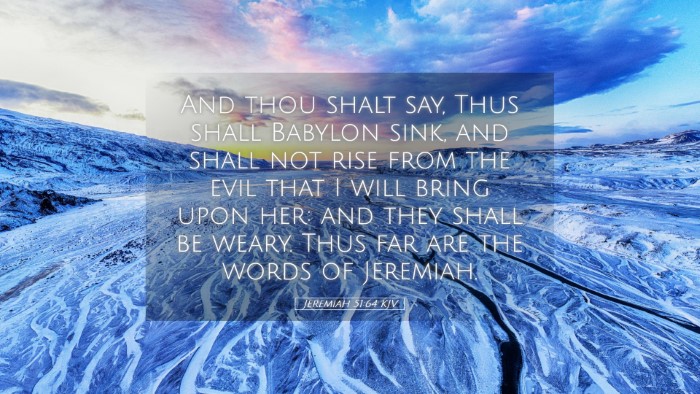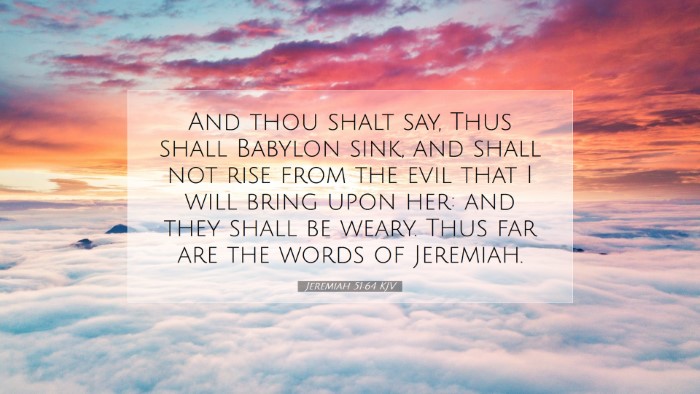Commentary on Jeremiah 51:64
Contextual Overview: Jeremiah 51:64 is a profound verse that encapsulates the prophecy regarding the fall of Babylon, symbolizing the broad theme of divine judgment and retribution. This verse forms part of a larger chapter where the prophet Jeremiah delivers God’s message about the impending doom of Babylon, a nation known for its arrogance and oppression. The language in this verse not only signals the downfall of a great empire but also serves as a warning against the pride and rebellion against God.
Exegesis of Jeremiah 51:64
Text: “And you shall say, ‘Thus shall Babylon sink, and shall not rise from the evil that I will bring upon her.’”
1. Interpretation of “Thus shall Babylon sink”
Matthew Henry emphasizes that the sinking of Babylon is a figurative expression indicating its ultimate destruction. Henry posits that Babylon represents not just a geographical location but also a spiritual reality of pride and false security. He notes that this statement is both a prophecy and a declaration of divine judgment, reaffirming that God’s sovereignty extends over nations.
2. The Nature of Judgment
Albert Barnes provides insights into the nature of the judgment that Babylon would face, interpreting it as an irreversible act befitting its actions. Barnes expounds that God’s judgment is not arbitrary, but a just response to the cumulative sins of the Babylonians, emphasizing that their downfall is a necessary consequence of their rebellion against God. He highlights the phrase “shall not rise,” underlining that once God’s judgment is pronounced, it is final.
3. Symbolism of Falling and Rising
Adam Clarke remarks on the implications of the imagery of falling and rising. Clarke draws a parallel between Babylon’s fall and the ultimate fate that awaits all those who oppose God. He believes that the act of “sinking” serves as a warning to nations and individuals alike about the futility of resisting the divine will. Furthermore, Clarke suggests that this verse encourages believers to remember that God will ultimately vindicate righteousness and establish His justice.
4. Theological Implications
Divine Sovereignty: The prophecy encapsulated in Jeremiah 51:64 highlights the overarching theme of divine sovereignty. The verse serves as a reminder that God’s will prevails, and no earthly power can thwart His plans. Both Henry and Barnes stress that nations like Babylon, despite their might and influence, are ultimately subject to God’s authority.
Hope for the Oppressed: This verse also carries a message of hope for those who suffer under oppression. As the judgment against Babylon was a sign of liberation for the Israelites, it illustrates that God does not forsake His people. The promise of destruction for Babylon served as a rallying point for those who remained faithful. Clarke, in particular, emphasizes the importance of this hope for the exiles who awaited divine intervention.
Historical Context
The historical backdrop of Babylon’s judgment is significant for understanding this prophecy. Babylon was a center of power during the time Jeremiah prophesied, filled with idolatry, cruelty, and pride. Henry notes that the Babylonians, in their opulence and spiritual bankruptcy, embodied all that was opposed to the holiness of God. This historical context accentuates the gravity of Jeremiah’s message and its relevance to contemporary readers.
5. Reflection for Today’s Believers
This passage invites contemporary Christians to reflect on the themes of pride and humility. The warning against Babylon serves as a timeless reminder of the consequences of deviating from God’s path. Barnes advocates for self-examination regarding personal and corporate behaviors that may evoke divine displeasure. As believers, understanding the weight of this prophecy encourages a posture of humility and repentance.
Concluding Thoughts
Jeremiah 51:64 presents a multifaceted understanding of divine judgment, human pride, and the hope found in God’s sovereignty. The combined insights from Henry, Barnes, and Clarke lead to a rich theological discourse beneficial for pastors, scholars, and students of the Word. In a world that often mirrors the spirit of Babylon—through pride, materialism, and idolatry—this passage calls for vigilance, faithfulness, and trust in the ultimate plan of God.
May this exploration of Jeremiah 51:64 serve as both a warning and an encouragement for all who seek to understand the depths of God’s justice and mercy.


